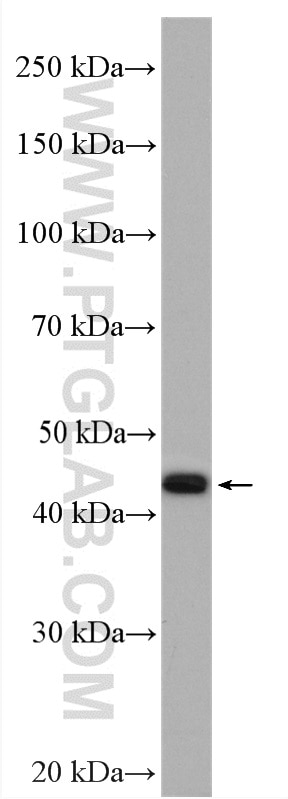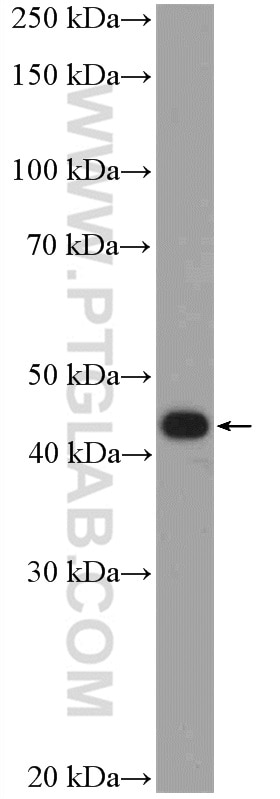Tested Applications
| Positive WB detected in | PC-3 cells, BxPC-3 cells |
| Positive IHC detected in | human stomach cancer tissue Note: suggested antigen retrieval with TE buffer pH 9.0; (*) Alternatively, antigen retrieval may be performed with citrate buffer pH 6.0 |
Recommended dilution
| Application | Dilution |
|---|---|
| Western Blot (WB) | WB : 1:500-1:1000 |
| Immunohistochemistry (IHC) | IHC : 1:50-1:500 |
| It is recommended that this reagent should be titrated in each testing system to obtain optimal results. | |
| Sample-dependent, Check data in validation data gallery. | |
Published Applications
| WB | See 14 publications below |
| IHC | See 3 publications below |
| IF | See 9 publications below |
Product Information
20989-1-AP targets PDX1 in WB, IHC, IF, ELISA applications and shows reactivity with human, mouse samples.
| Tested Reactivity | human, mouse |
| Cited Reactivity | human, mouse, rat |
| Host / Isotype | Rabbit / IgG |
| Class | Polyclonal |
| Type | Antibody |
| Immunogen |
Peptide Predict reactive species |
| Full Name | pancreatic and duodenal homeobox 1 |
| Calculated Molecular Weight | 31 kDa |
| Observed Molecular Weight | 40-50 kDa |
| GenBank Accession Number | NM_000209 |
| Gene Symbol | PDX1 |
| Gene ID (NCBI) | 3651 |
| RRID | AB_2878784 |
| Conjugate | Unconjugated |
| Form | Liquid |
| Purification Method | Antigen affinity purification |
| UNIPROT ID | P52945 |
| Storage Buffer | PBS with 0.02% sodium azide and 50% glycerol, pH 7.3. |
| Storage Conditions | Store at -20°C. Stable for one year after shipment. Aliquoting is unnecessary for -20oC storage. 20ul sizes contain 0.1% BSA. |
Background Information
Pancreatic duodenal homeobox-1 protein (PDX-1), also designated INS promoter factor (IPF1), INS upstream factor 1 (IUF1), somatostatin trans-activating factor-1 (STF-1) and glucose-sensitive factor (GSF), is a 282 amino acid homeodomain-containing transcription factor present in pancreatic beta-cells. PDX-1 is a key regulator of pancreatic islet development and INS gene transcription in beta-cells. PDX-1 is expressed in all cells at the early stages of development and is mainly restricted to the pancreas and duodenum in adult. HNF-3b, HNF-1a and SP1 positively regulate the PDX-1 enhancer element. PDX-1 is also regulated by glucagon-like peptide through activation of adenylyl cyclase, which results in an increase in intracellular cAMP activity. The increased levels of cAMP, and the resulting activation of PKA, lead to an increase in PDX-1 transcription and translocation of the protein to the nuclei of beta-cells. PDX-1 binds to the sequence C(C/T) and can heterodimerize with PBX. PDX-1 is phosphorylated by the SAPK2 pathway under high glucose concentrations. Mutations in the PDX-1 gene can cause maturity-onset diabetes of the young and pancreatic agenesis.
Protocols
| Product Specific Protocols | |
|---|---|
| IHC protocol for PDX1 antibody 20989-1-AP | Download protocol |
| WB protocol for PDX1 antibody 20989-1-AP | Download protocol |
| Standard Protocols | |
|---|---|
| Click here to view our Standard Protocols |
Publications
| Species | Application | Title |
|---|---|---|
ACS Appl Mater Interfaces Targeted Polymeric Nanoparticles Based on Mangiferin for Enhanced Protection of Pancreatic β-Cells and Type 1 Diabetes Mellitus Efficacy. | ||
Biomaterials Three-dimensional cell-culture platform based on hydrogel with tunable microenvironmental properties to improve insulin-secreting function of MIN6 cells. | ||
Biofabrication Dual-core coaxial bioprinting of double-channel constructs with a potential for perfusion and interaction of cells. | ||
J Mol Cell Biol Human umbilical cord-derived mesenchymal stem cells alleviate oxidative stress-induced islet impairment via the Nrf2/HO-1 axis | ||
J Biol Chem Tectorigenin enhances PDX1 expression and protects pancreatic β-cells by activating ERK and reducing ER stress. | ||








